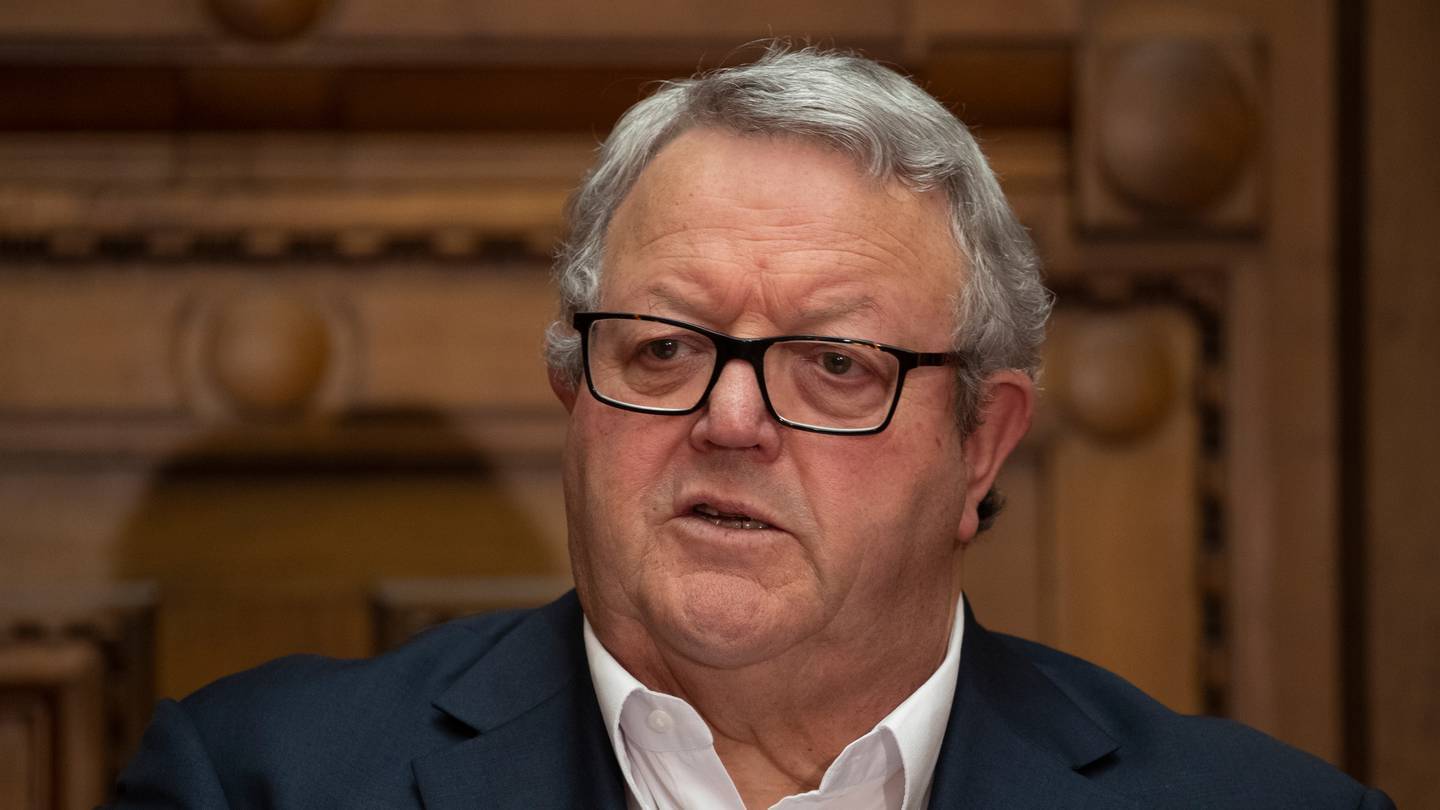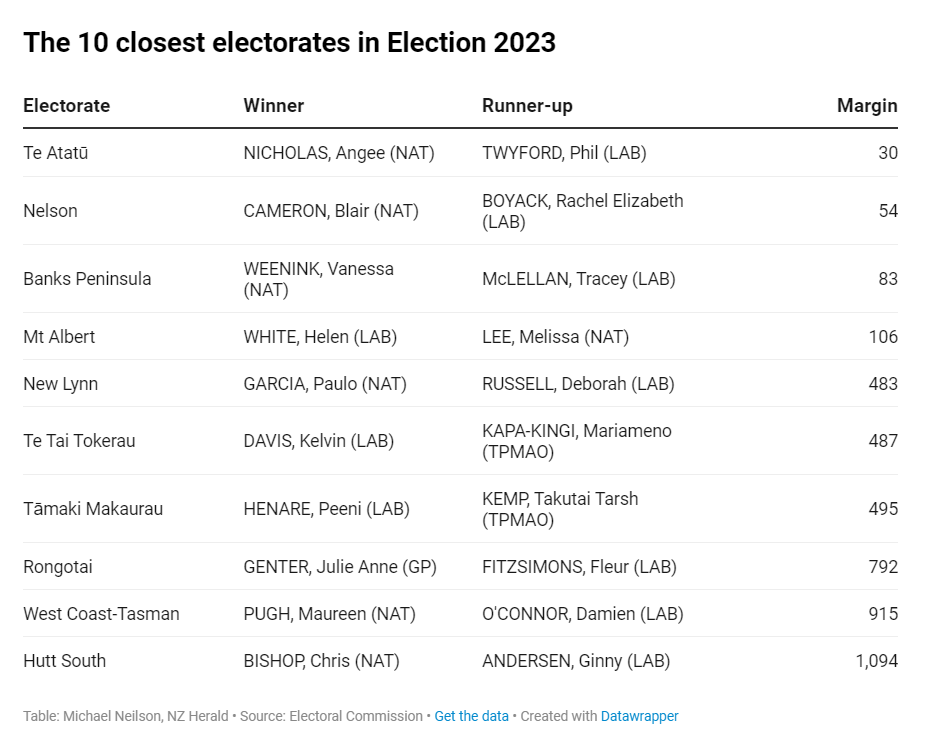
The final results, to be unveiled at 2pm, will reveal the news many have been waiting for - whether National and Act will need the support of NZ First to form a government.
But the political fortunes of half a dozen candidates in seats with tight margins on election night will also be revealed, which could also likely impact the fortunes of list MPs elected in National, Labour and the Greens.
On election night, October 14, the preliminary results delivered a one-seat majority to National and Act, acquiring 50 and 11 seats respectively.
At 61 seats together they made up just over half of the 121 seats in Parliament (there is currently a one-seat overhang due to Te Pāti Māori winning more electorate seats than their party vote share).
The reason for the uncertainty about that result holding is that a record estimated 567,000 people cast special votes - or just over 20 per cent of all votes.
Based on New Zealand Herald analysis of special votes since 1999, all of the parties that have gained seats in Parliament following the declaration of the official results have been left-leaning. National has lost at least one seat in every election bar one since 1999.

In 2017, the final vote count saw National’s initial seat allocation reduced by two while Labour and the Greens gained one seat each.
In 2020, once again, special votes leaned left and National had two fewer seats than the election night result predicted.
The left/right distribution of votes on election night in 2017 and 2023 is very similar, meaning it could be indicative of the final results.
This would see National drop three seats with one each going to Labour and the Green Party.
Because Te Pāti Māori typically does well in the special votes count, it is likely to see a small increase in its party vote share, meaning the overhang it currently holds would drop away. An overhang occurs when a party wins more electorate seats than it would through the party vote.
National’s Gerry Brownlee is currently on track to return to Parliament on the party list, but if National holds all of its electorate seats and loses at least two list seats - as has occurred in the past two elections - the veteran MP, who has been mooted as the potential next Speaker, could be pushed out.
This unexpected outcome is due to National performing exceptionally well in the electorates - winning 45, based on the preliminary results. This means, provided they don’t lose any on the special votes, with 50 seats overall they only have space for five list MPs.
At the top of the list of MPs would be deputy leader Nicola Willis followed by Paul Goldsmith.
A potential drop of three seats for National, and if their electorates all held as currently, could mean current MPs Melissa Lee, Brownlee and Andrew Bayly don’t make it back in. A drop of just two seats would see Lee return but for Brownlee, a drop of one is needed, as occurred in 2014.
Bayly is likely to enter Parliament regardless as a favourite to win the Port Waikato by-election. This would see Parliament get an overhang of one seat.
Former cabinet minister Steven Joyce told Newstalk ZB’s Mike Hosking that he expects National to lose two seats.
”The advanced vote was as high as 41-42 per cent for National but, on the day, it was 36-37 per cent,” he said. Let’s say the special largely reflects what happened on the day, they may lose a couple of seats. However, if the specials include a lot of advanced voting, then it could be better for National.”
Joyce said he expects the international votes to break for the party as there was a lot of anger about New Zealanders being shut out of the country.
When asked if he thinks a government could be in place by next week, Joyce said that will largely depend on Winston.
”Seymour will be enthusiastic to get started, but Winston won’t mind a few days either way,” he said.
”At this stage, he doesn’t have too many cards to play.”
His other alternative is to sit on the cross benches and vote against the government on a regular basis, which will be tool in which the public will get more and more frustrated with him.”
Peter Dunne says incoming Prime Minister Christopher Luxon’s people-management skills are about to be tested, as he deals with the two “prickly personalities” of Peters and Seymour in government.
Speaking to RNZ’s First Up this morning, the former United Future leader said talks between the trio had probably started by finding broad areas of potential agreement around which National, Act and NZ First could structure a government, whether as a three-way coalition or with NZ First for confidence and supply.
Dunne believed it would only be a short time before the new government was formed.
If Act and NZ First had a good working relationship it would be much easier for National to govern, but “if those two [have] daggers drawn from day one, it’s going to be very problematic”.
Asked how hard it was to work with Peters, Dunne said: “You’ve got to treat [Peters] with the respect that he thinks he’s entitled to.
”He’s got a very prickly sense of his own self-worth, if you like, and if that is in any way threatened or perceived to be threatened things turn to custard pretty quickly.”
Each party would want to ensure its credibility was maintained through the process, so Act and NZ First were not seen as “lapdogs” and National did not look like it was giving everything away to get power.
Te Pāti Māori currently has 2.6 per cent of the party vote, which equates to three seats, yet it won four electorates. Based on past results it is likely to see that party vote share increase to about 3 per cent, which would give it four seats.
The small bump to Labour, provided there was no change in the electorates, would see Vanushi Walters return to Parliament, with Glen Bennett ranked just above, currently looking likely to return after Andrew Little’s retirement. The potential increase for the Green Party would see Christchurch-based Kahurangi Carter enter Parliament.

Seats to watch
This shift in special vote results can also see changes in the electorate seats.
There are about seven electorate seats with a decent chance of flipping after the final votes have been counted.
The closest is in the typically Labour stronghold Te Atatū, where National’s Angee Nicholas is ahead of Labour’s Phil Twyford by just 31 votes. Labour has only lost the Auckland seat once since it was formed in 1978 and Twyford has held the seat since 2011.
The second-closest electorate race is in Nelson, where National’s Cameron Blair is ahead of Labour’s Rachel Boyack by 54 votes. Boyack claimed the seat in 2020 but prior to that, it had been held by former National MP Nick Smith since 1996.
In Banks Peninsula, which covers parts of southern Christchurch and rural areas and towns, National’s Vanessa Weenink holds an 83-seat lead over Labour incumbent Tracey McLellan. The seat, which changed to Port Hills between 2008 and 2020, has only been held once by National. Former Labour MP Ruth Dyson held both forms of the electorate from 1999 until 2020 when she retired.
Another seat that could flip is Mt Albert, another Labour stronghold that MP Helen White currently holds by just 106 votes over National’s Melissa Lee. The electorate has elected only Labour Party MPs since it was first contested at the 1946 election.
It was vacated after former Prime Minister Jacinda Ardern stepped down this year. Ardern won it in 2020 with 72 per cent of the vote and a more than 21,000 vote lead over Lee. Ardern also won a large majority in 2017. Lee would likely re-enter Parliament regardless based on her high list ranking.
Another close seat, but less likely to shift, is New Lynn, where new National candidate Paulo Garcia holds a 483-vote lead over Labour incumbent Deborah Russell.
New Lynn is yet another electorate previously regarded as safe for Labour, held by the party - with a few boundary variations - ever since it was formed at the 1963 election.
Russell has a high enough list ranking to be elected even if she loses the seat.
There are also two interesting battles taking place in the Māori electorates.
In Te Tai Tokerau Labour’s Kelvin Davis holds a 487-vote lead over Te Pāti Māori’s Mariameno Kapa-Kingi. Davis has held that seat since 2014.
There is a similiarly-close contest in Tāmaki Makaurau, where Labour’s Peeni Henare is ahead of Te Pāti Māori’s Takutai Tarsh Kemp by 495 votes.
Henare has also held that seat since 2014.
Other close seats to watch include Rongotai, West Coast-Tasman and Hutt South.












